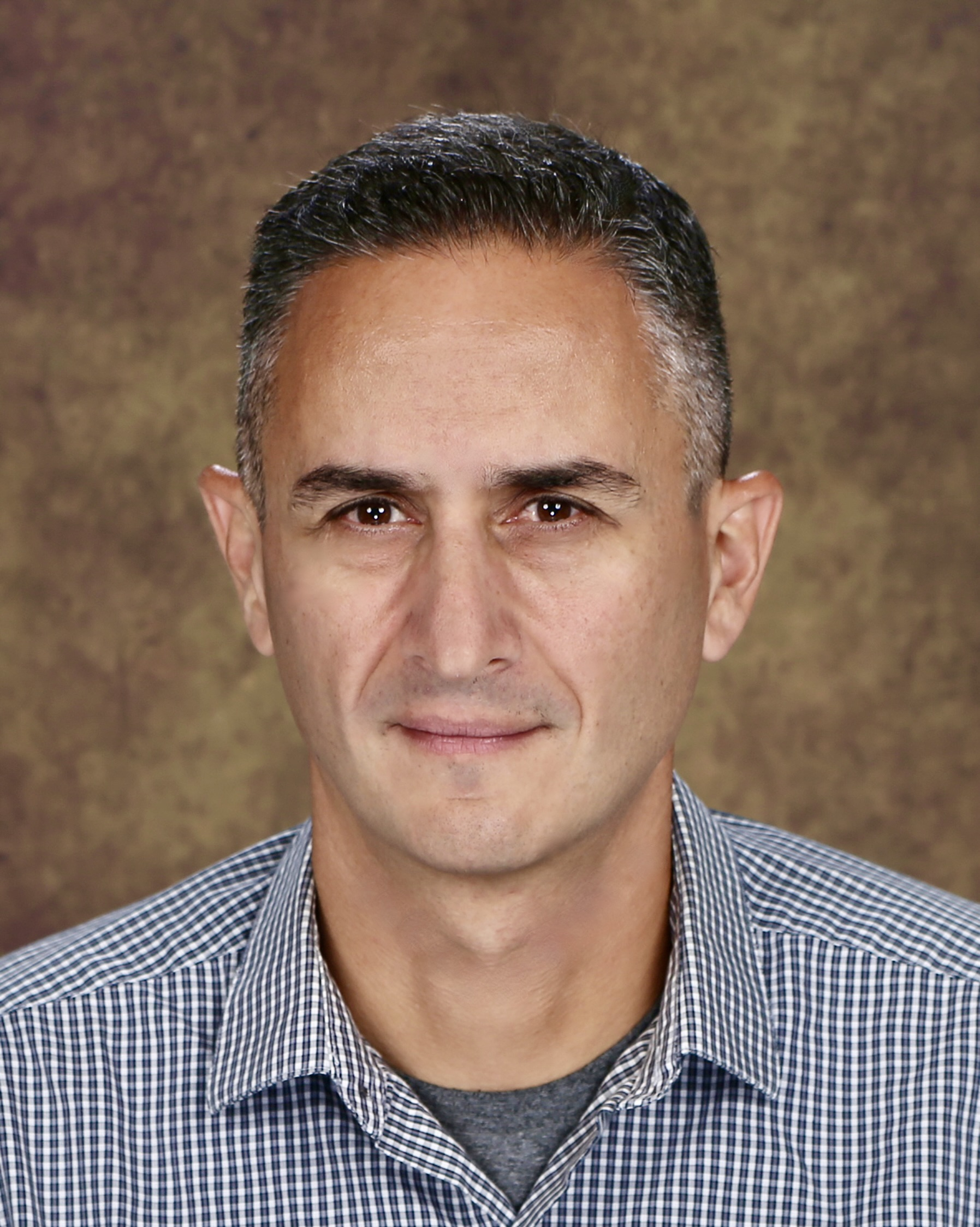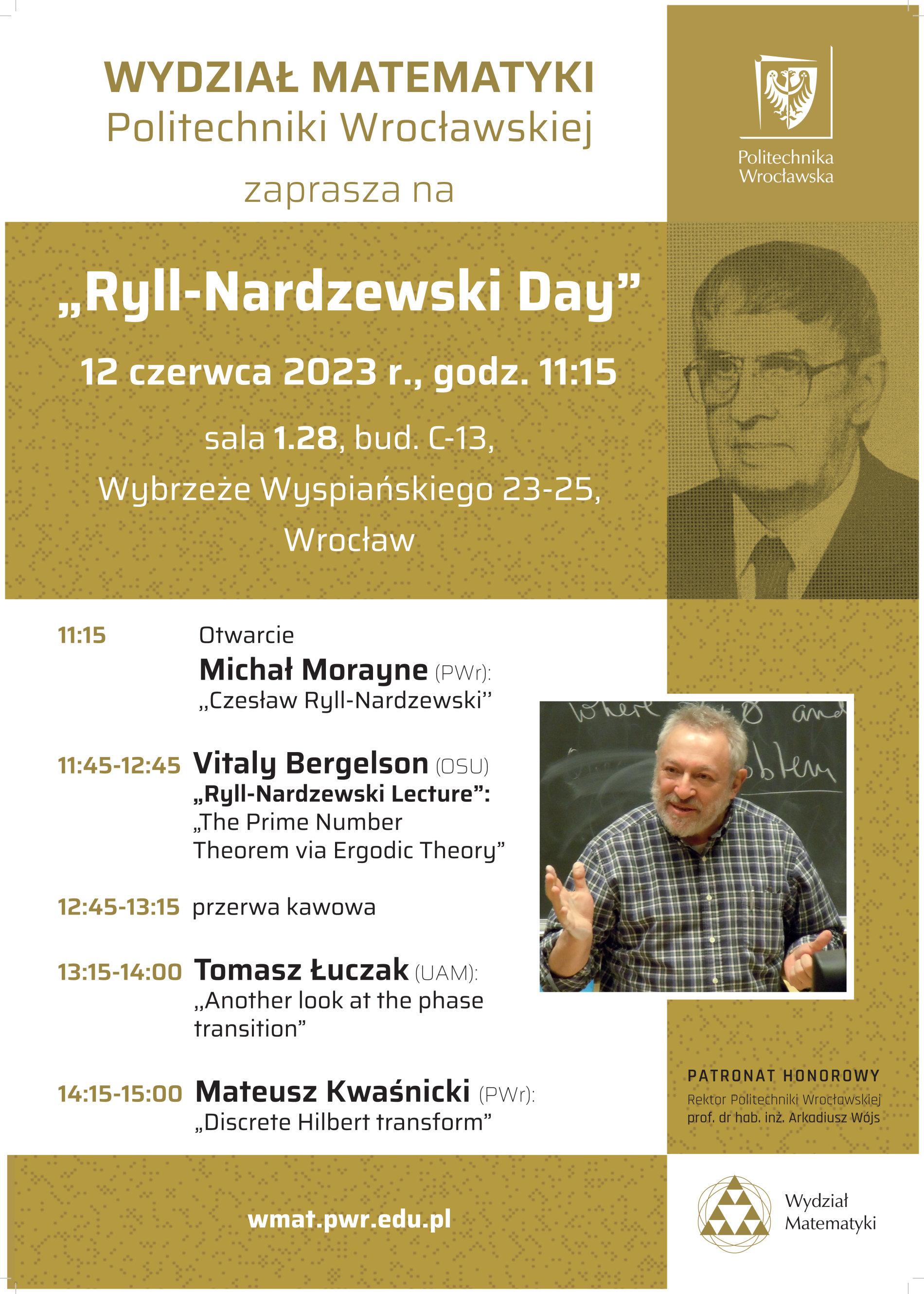TWOJA PRZEGLĄDARKA JEST NIEAKTUALNA.
Wykryliśmy, że używasz nieaktualnej przeglądarki, przez co nasz serwis może dla Ciebie działać niepoprawnie. Zalecamy aktualizację lub przejście na inną przeglądarkę.
W dniu 28 czerwca 2025 odbędzie się drugi Ryll-Nardzewski Day. Głównym celem cyklu jest promocja matematyki polskiej oraz osoby Czesława Rylla-Nardzewskiego jako ikony polskiej szkoły matematycznej oraz wybitnego Wrocławianina.
Wykłady odbędą się w budynku C-13 w sali 1.27. Po konferencji zapraszamy na lunch w budynku H-14.
Program konferencji:
11:15–11:25: otwarcie konferencji
Rektor Politechniki Wrocławskiej
prof. dr hab. inż. Arkadiusz Wójs
 11:30–12:25: Ryll-Nardzewski Lecture
11:30–12:25: Ryll-Nardzewski Lecture
Nikos Frantzikinakis
Uniwersytet Kreteński
Ergodic properties of bounded sequences and applications
12:30–13:10:
Piotr Biler
Uniwersytet Wrocławski
A nonlocal parabolic problem
13:15–13:55:
Jacek Małecki
Politechnika Wrocławska
Stochastic particle systems with weak repulsive forces
Streszczenia wykładów:
Nikos Frantzikinakis (Uniwersytet Kreteński)
Ergodic properties of bounded sequences and applications
How can we measure and exploit randomness properties of a bounded sequence? A construction due to Furstenberg from the 70's allows us to encode the statistical properties of bounded sequences dynamically using the language of ergodic theory. This provides a different point of view, which has important advantages and has led to several breakthroughs in ergodic theory, combinatorics and, more recently, number theory. Examples include various refinements of Szemeredi’s theorem on arithmetic progressions, progress towards the Sarnak and Chowla conjecture, and the partition regularity of Pythagorean triples. I will review some related results with an emphasis on more recent developments.
Piotr Biler (Uniwersytet Wrocławski)
A nonlocal parabolic problem
We discuss the existence of radially symmetric solutions (evolution and self-similar cases) of the minimal Keller–Segel system in ℝd:
ut − Δu + ∇·(u∇φ) = 0,
Δφ + u = 0,
under optimal assumptions on the initial data u0 = u(0, ·). We are interested, in particular, in minimal regularity assumptions imposed on the initial data in order to a local-in-time solution exists, and size conditions for (approximate) dichotomy: global-in-time existence versus finite time blowup of solutions. The results, obtained in collaboration with Grzegorz Karch, Dominika Pilarczyk, Hiroshi Wakui and Jacek Zienkiewicz, are essentially those reported in [1] and [2].
[1] P. Biler, Singularities of solutions to chemotaxis systems, i--xxiv, 1--207; De Gruyter Series in Mathematics and Life Sciences 6, Walter de Gruyter, Berlin, 2020. ISBN 978-3-11-059789-9. DOI:10.1515/9783110599534
[2] P. Biler, G. Karch, H. Wakui, Large self-similar solutions of the parabolic-elliptic Keller--Segel model, Indiana Univ. Math. J. 72 (2023), pp. 1027–1054. DOI:10.1512/iumj.2023.72.9218
Jacek Małecki (Politechnika Wrocławska)
Stochastic particle systems with weak repulsive forces
The talk will be devoted to stochastic particle models with repulsive interactions, with particular emphasis on cases where the repulsive force coming from a singular drift is too weak to prevent particle collisions. We will discuss conditions ensuring the existence of such models together with an examination of their behavior, focusing on collisions, multi-collisions, and the times of collisions. The presented results will be partially drawn from joint projects with Sergio Andraus, Piotr Graczyk, and Nicole Hufnagel.
W dniu 12 czerwca 2023 odbył się pierwszy Ryll-Nardzewski Day, którego celem była promocja matematyki polskiej oraz osoby Czesława Rylla-Nardzewskiego jako ikony polskiej szkoły matematycznej oraz wybitnego Wrocławianina.
Do najbardziej znanych osiągnięć profesora Czesława Rylla-Nardzewskiego należą twierdzenia o punkcie stałym oraz twierdzenia o selektorach mierzalnych. Ten wielki matematyk położył ponadto podwaliny pod wiele nowoczesnych kierunków badań w matematyce, między innymi pod teorię ergodyczną i jej zastosowania do badania statystycznych własności rozwinięć liczb w ułamki łańcuchowe. Był również doskonałym wykładowcą i nauczycielem. Pragniemy, aby pamięć o Nim nie uległa zatarciu i chcemy wyrazić należny Mu szacunek poprzez promowanie Jego nazwiskiem najlepszych współczesnych osiągnięć w bliskich Mu działach matematyki.
Konferencję otworzył wykład Michała Morayne na temat postaci Czesława Rylla-Nardzewskiego. Na część naukową konferencji złożyły się następujące trzy wykłady:
